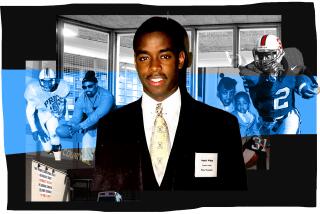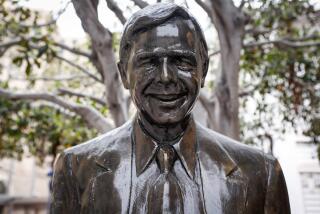CAPITOL JOURNAL : Wilson Takes Different Path to Land in Same Spot
- Share via
SACRAMENTO — Pete Wilson and George Deukmejian were settling back for a long, relaxing lunch in the governor’s suite about a year ago when something got passed around the table that ruined their appetites.
Along with the salad dressing, the governor-elect and the lame-duck governor were handed figures showing that the state already was running $400 million in the red, just four months into the new fiscal year.
For Deukmejian, who had battled the Legislature the previous summer to obtain a compromise package of spending cuts and tax increases that he was told would erase a $3.6-billion deficit, the news “was a shock,” Wilson recalls. “George Deukmejian had hoped--and until about the (November) election had thought--that his legacy to the state and to me was going to be a state in the black.”
Far from it. Sometime later, as the recession deepened, Wilson was informed by his finance director-designate, Thomas W. Hayes, that he was staring at a $5-billion deficit. “That’s not possible,” Wilson remembers saying. “Yes, it is possible, and it could get worse,” Hayes replied.
And, of course, it did--ultimately reaching $14.3 billion and leading last July to $7.6 billion in higher taxes and $3.2 billion in program cuts, plus $3.5 billion in money transfers, bookkeeping gimmicks and some wishful thinking that so far has not panned out.
A question that has been asked repeatedly ever since around the Capitol is this: If, after that lunch, Deukmejian had been the governor responsible for resolving the looming fiscal crisis, would he have handled the state’s predicament any differently? Would he have held out for bigger spending cuts, smaller tax hikes and more budget “reforms”?
He was, after all, “The Iron Duke,” a nickname that reflected his rigid adherence to conservative dogma. Deukmejian always had resisted tax hikes mulishly and accepted them only as a last resort. He also set an all-time record for gubernatorial vetoes, 2,298. “Dr. No,” they called him.
The consensus of some top Deukmejian associates, however, is that “The Duke” would have wound up signing the same tax increases and program cuts as Wilson did. In fact, the political junkies who watch for such things--including some who have advised both Republican governors--say that on big, high-intensity issues, Wilson and Deukmejian usually have landed in the same spot.
They just have gotten there by different routes--Deukmejian by a predictable, well-beaten path through the Republican right, his political base; and Wilson via a circuitous, venturesome course in and around the philosophical center, seeking to expand his corps of followers.
A prime example of their dissimilar styles but philosophical semblance was the budget fight. After moderate Senate Republicans and liberal Democrats thought they had struck a deal with Wilson to enact a spending plan by the start of the new fiscal year, he bowed to the wishes of conservatives and business interests and scuttled the compromise in an unsuccessful effort to achieve major reforms in the workers’ compensation system. At business’s insistence, Wilson also flip-flopped on his long opposition to personal income tax hikes in order to spare the corporate community big tax increases on utilities, including telecommunications.
But Wilson, en route to this final position, had angered conservatives and worried business executives by announcing early on his willingness to accept major tax increases--something Deukmejian never had done.
Another example of Wilson allying himself with Deukmejian was his veto of AB 101, the emotion-charged bill that would have outlawed job discrimination against homosexuals. But Wilson had created false hopes among gay rights activists by previously saying he was “very likely” to sign the measure. Deukmejian, by contrast, kept mum on the issue until he vetoed the bill on the same grounds Wilson did, that it was unnecessary and potentially burdensome for business.
So far, Wilson even is vetoing bills at nearly double the clip of Deukmejian.
There are some noticeable differences between the two: Wilson is stronger for abortion rights, family planning, early childhood development and the environment; he schmoozes better with legislators, and is more media-oriented.
But, observed one Republican strategist who knows them both well: “Basically, they’re cut from the same philosophical cloth.”
Said another: “Deukmejian always felt he had to keep his Republican base unified. Wilson always has believed differently--that in order to win elections, you have to do it in the center.”
“What confounds Pete’s friends and his critics,” a Wilson associate said, “is that just when they think they have him pegged, he throws them for a loop.”
But when the blue chips are down and the pressure mounts, bet that Wilson will end up standing on the right, just as Deukmejian did.
More to Read
Get the L.A. Times Politics newsletter
Deeply reported insights into legislation, politics and policy from Sacramento, Washington and beyond. In your inbox twice per week.
You may occasionally receive promotional content from the Los Angeles Times.











